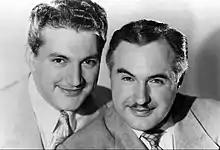George Liberace | |
|---|---|
 George Liberace (right) with his brother Liberace in 1953 | |
| Background information | |
| Born | July 31, 1911 Menasha, Wisconsin, U.S. |
| Died | October 16, 1983 (aged 72) Las Vegas, Nevada, U.S. |
| Occupation(s) | Musician, television performer |
| Instrument(s) | Violin |
| Labels | Imperial Records |
George Liberace (July 31, 1911 – October 16, 1983) was an American musician and television performer.
Biography
Born in Menasha, Wisconsin on July 31, 1911, George Liberace was the elder brother and business partner of famed entertainer Liberace. He appeared regularly on his brother's syndicated television show in the 1950s as a violin accompanist and orchestral arranger.[1] On occasions when he did not appear, Liberace would often say his catchphrase "I wish my brother George was here".[2]
In the 1960s and 1970s, his name was licensed to George Liberace Songsmiths, Inc., a mail-order music publishing operation of somewhat dubious integrity.[3] On October 5, 1974, a new independent UHF television station, KMUV-TV Channel 31, signed on with George Liberace who worked at the station as the general manager and on-the-air host. The new station played non-stop movies. However, on May 1, 1976, KMUV abandoned its all-movie format and largely began to air Spanish-language programming, along with some English-language religious programs. George Liberace resigned his managerial job with KMUV at about this time.
In 1979, he retired from conducting and performing the violin onstage and devoted most of his time to managing the Liberace Museum in Las Vegas, even occasionally giving tours to visitors himself in showing the cars, pianos and costumes and other artifacts owned by his brother. From 1967 until his death, George Liberace was married to Eudora Albrecht.[1] He lived most of his life in Palm Springs, California, in a house owned by his brother.[4]
George Liberace died of leukemia at a hospital in Las Vegas, Nevada, on October 16, 1983, at age 72, and was interred in Forest Lawn Memorial Park in the Hollywood Hills.
References
- 1 2 "George Liberace". IMDB.
- ↑ "Rob Lowe: Liberace invented bling". Music-News.Com.
- ↑ "Action Line: Music, Maestro, Please". Independent Press-Telegram. June 16, 1968. p. 6. Retrieved February 2, 2016 – via Newspapers.com.

- ↑ Wallace, David (2008). A City Comes Out. Fort Lee, NJ: Barricade. p. 107. ISBN 978-1569803493. LCCN 2008022210. OCLC 209646547. Archived from the original on June 17, 2013.
External links